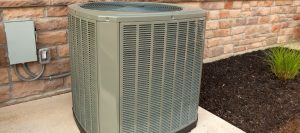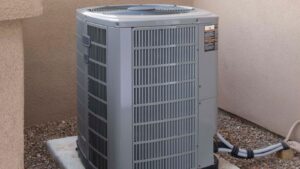
When you take good care of your furnace, it can last a long time—think 15 to 20 years! Because it’s going to be with you for so long, you’re going to want to pick the right one.
If you’re ready to buy or just considering a purchase, keep these things in mind before installing your unit: type of heating system, source of fuel, size, and efficiency rating. Be sure to work with an expert HVAC contractor to help you choose the perfect unit for your home.

This is your most common furnace. Think of it like a light switch—either it’s fully on or it’s completely off. No in-between. When it’s on, you’ll hear a sound (like it’s getting started) and then, warm air comes out from the vents. These systems will typically cost between $2,000 to $3,500 for both parts and labor.
This furnace is a step up from the single-speed unit. It’s got two flames: a small one that’s always on when it’s just a bit chilly and a big one that turns on when it gets very cold. Because it’s always sort of on, it’s not as noisy as the single-stage one. These systems are a little pricier, between $2,500 and $4,000 for labor and parts.
This modulating furnace is great at keeping your home’s temperature just right throughout the day! Instead of a full on or off, the flame adjusts little by little, making sure your home stays comfy all season long. This one’s on the pricier side, ranging from $5,000 to $7,500 for parts and labor.
These are the most common because they’re the most cost friendly. Here’s how they do their thing: They take in cold air, heat it up with natural gas, and then a fan sends that cozy, warm air all around your home.
These are a lot like gas ones. They warm up the air using electricity, then a blower sends the warm air to different parts of your home. If you don’t have a gas line nearby, or you’re worried about safety stuff like carbon monoxide, this could be your pick.
These use propane, which comes from a storage tank outside. The furnace burns propane to make warm air. The good thing? They’re small, so they fit almost anywhere. Plus, if your power goes out a lot, this might be a smart choice since they don’t need electricity.
Getting the right size for your furnace is super important. If it’s too big or too small, it might use too much energy, not heat your home just right, or even break down more often.
Before you get a new furnace, think about:
This might sound a bit tricky, but don’t worry. You can talk to a professional HVAC company like Flo-Aire Heating, Cooling & Electrical who knows all about furnaces. We’ll look at your home and tell you what size and type of furnace is best for you.
Every part of your house can feel a bit different. Some rooms are in a “hot zone” and might get hot quickly, like your kitchen when you’re cooking. Other rooms are in a “cold zone”, like a bedroom above a chilly garage, might always feel a bit cool. If your thermostat is near one of these rooms, the rest of your house might end up feeling too hot or too cold. Plus, you might end up using more power than you need.
That’s where a zoning system comes in handy! It splits your house into different areas, or “zones”. Every zone has its own thermostat. That way, each part of your house gets just the right amount of heat or cold air.
Inside your air system, there are things called dampers. They can open or close to let more or less air into each zone. This helps balance the temperatures in your home, so every room feels just right. And the best part? It makes sure you’re not wasting energy!
Your furnace isn’t just about heating; it’s about comfort. Yes, there’s the price to think about, but remember: you’re making a choice you’ll live with for nearly two decades. Sometimes, the added touches can make a world of difference.
Features worth considering:
Every new furnace typically comes with a manufacturer warranty. It’s like a promise that the parts of your furnace should work properly for a certain period. It’s important to note that many of these warranties need to be registered to be valid. So, make sure to fill out any necessary paperwork!
Generally, these warranties are in operation for five to ten years. This gives you peace of mind, knowing that your furnace is covered for a good chunk of its lifespan. Looking for additional peace of mind? You might be offered more coverage options. This can include an Installation Warranty (covering the installation process) or an Extended Warranty (prolonging the warranty period).
Usually, when you’re quoted a price for a new furnace, it covers the big stuff: the furnace parts and the work to put it in.
But sometimes, other parts of your home might need a few adjustments for your new furnace to work its best. This could mean changes to things like the ducts in your house, the vents, or even the chimney.
These changes might mean extra costs, so keep that in mind as you budget.
When you buy a new furnace, you’re not just cutting down your energy bills. Often, you can get money back.
Utility companies sometimes give rebates if you choose a furnace that’s really energy efficient. A popular way to find these deals is the Energy Star rebate program, which you can find in many places.
Picking the right furnace is key to long-lasting home warmth. For Metro Detroit residents, the choice is clear. Flo-Aire Heating, Cooling & Electrical has been a reliable partner for homeowners since 1955. When considering a furnace change, lean on Flo-Aire’s trusted expertise. Give us a call today at (734) 285-1809!
It's best to have your furnace checked every year, ideally before the winter season starts. Regular check-ups can ensure optimal performance and extend the lifespan of your unit.
Absolutely! Furnaces with high energy efficiency ratings are environmentally friendly. Not only do they reduce your carbon footprint, but they can also qualify you for rebates and save on monthly bills.
You'll want to look for its AFUE (Annual Fuel Utilization Efficiency) rating. A higher rating, like 90% or above, indicates top efficiency. This means more of the fuel gets converted to heat, saving you money in the long run.
Common signs include uneven heating in rooms, the need for frequent repairs, a yellow pilot light, or a noticeable increase in your energy bills. If you notice these signs, it might be time to think about a replacement.
While it might seem like a way to save, installing a furnace requires expertise. Mistakes could lead to safety hazards, inefficiencies, or even void your warranty. It's always best to rely on a trained professional for installation.
Locally owned and operated in Southgate, MI since 1955, Flo-Aire Heating, Cooling & Electrical is one of the top heating & cooling companies in Southeast Michigan. Flo-Aire provides residential, commercial and industrial HVAC services throughout all of Metro Detroit.


